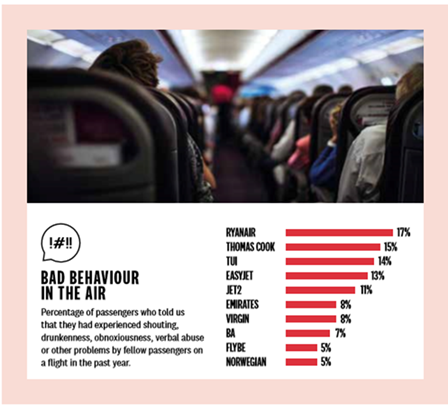Ryanair tops list of airlines disrupted by drunken passengers, survey finds
Incidents reported to Which? Travel include 'a plane-load of passengers flown hundreds of miles out of their way after the flight had to divert to offload one violent, out-of-control individual'
Your support helps us to tell the story
From reproductive rights to climate change to Big Tech, The Independent is on the ground when the story is developing. Whether it's investigating the financials of Elon Musk's pro-Trump PAC or producing our latest documentary, 'The A Word', which shines a light on the American women fighting for reproductive rights, we know how important it is to parse out the facts from the messaging.
At such a critical moment in US history, we need reporters on the ground. Your donation allows us to keep sending journalists to speak to both sides of the story.
The Independent is trusted by Americans across the entire political spectrum. And unlike many other quality news outlets, we choose not to lock Americans out of our reporting and analysis with paywalls. We believe quality journalism should be available to everyone, paid for by those who can afford it.
Your support makes all the difference.Ryanair tops the league for air rage caused by excessive alcohol, according to Which? Travel, with one in six passengers reporting in-flight disruption.
In a survey of 7,900 readers, 17 per cent of those who had flown on the Irish airline in the past year reported that they had experienced “shouting, drunkenness, obnoxiousness, verbal abuse or other problems”.
Disruption was almost as frequent on Thomas Cook Airlines, TUI and easyJet, with air rage reported by 15, 14 and 13 per cent of passengers respectively.
One incident involved a stag party from Newcastle setting seat covers alight on a flight to Alicante. Other episodes include “people fighting each other in the aisles and then turning on the cabin crew when they tried to intervene”, as well as “a plane-load of passengers flown hundreds of miles out of their way after the flight had to divert to offload one violent, out-of-control individual”.
Flybe and Norwegian were at the foot of the table, with 5 per cent of passengers experiencing disruptive events. Overall, the average was 10 per cent.

The vast majority of “air-rage” incidents are alcohol-fuelled. Aviation law forbids anyone being drunk on an aircraft, and airlines have a right to refuse to carry passengers that they consider to be a potential risk to the safety of the aircraft.
Airlines are obliged to report in-flight incidents to the Civil Aviation Authority (CAA). Which? Travel says that the authority’s figures show a four-year average from 2012 to 2016 of 186 incidents a year, representing one every two days.
“In 2017, that number had jumped to 417, with 2018 on course to be even higher,” it says.
Under a code of practice introduced in 2016, airlines, airport bars and retailers are not supposed to “encourage excessive alcohol consumption”.
The code also calls on airlines to “deny boarding where necessary to protect fellow passengers and crew from disruptive behaviour”.
Ryanair has demanded that passengers should be served no more than two drinks at the airport before boarding a flight. The airline has also called for a ban on alcohol sales at airports before 10am.
Last year the airline’s chief executive, Michael O’Leary, told The Independent: “We have passengers, particularly during flight delays, stuck in airport bars drinking six, eight, 10 pints.
“They get on board, particularly in groups, and they’re rowdy and they’re a threat to safety. That needs to be regulated.
“On our flights, averaging one hour 15 minutes, the most you’ll be served is one or two drinks. And if a passenger is being disruptive, he or she won’t be served with alcohol at all.”
The editor of Which? Travel, Rory Boland, criticised carriers for paying commission to staff for selling drinks, saying: “Airlines need to take more responsibility for preventing passengers having too many drinks, and incentivising cabin staff to flog more gin and tonics isn’t the right way to do that.
“People should be able to take a flight without having to worry about their trip being disrupted or journey diverted by rowdy passengers who have had one too many.”
For the past five years, a programme called Campus Watch has operated at Glasgow Airport, involving check-in staff, security teams, bar staff, retailers and airline crew.
“Staff across the campus are encouraged to report the details of any potential incident of disruptive behaviour to the airport’s central control room through a dedicated phone,” says the airport.
A description of the passenger and their travel details is then shared across the airport by a text alert.
In addition, Police Scotland patrols the drop-off area ahead of potentially problematic flights and make themselves known to large groups arriving at the airport.
Jet2 has been campaigning for tighter controls of airport drinking, and this year banned a passenger for life after he “displayed deplorable and aggressive behaviour to both crew and fellow customers” on board a flight from Belfast to Ibiza, which diverted to Toulouse.
The airline warns passengers: “We reserve the right to request that you undertake a breath test procedure at any time prior to travel. If you either refuse to take the test or fail the test, we reserve the right to refuse you permission to travel.” It has banned the sale of alcohol on its flights before 8am.
Jet2 also says it will not carry passengers who “have threatened, insulted, abused or acted in a disorderly way (either by words or action) towards ground staff, a member of the crew or our other passengers”.
The Which? Travel survey found that one in nine Jet2 passengers (11 per cent) in the past year reported in-flight disruption.
The government is consulting on whether airport sales of alcohol should be subject to the same licensing laws that apply outside.

Join our commenting forum
Join thought-provoking conversations, follow other Independent readers and see their replies
Comments